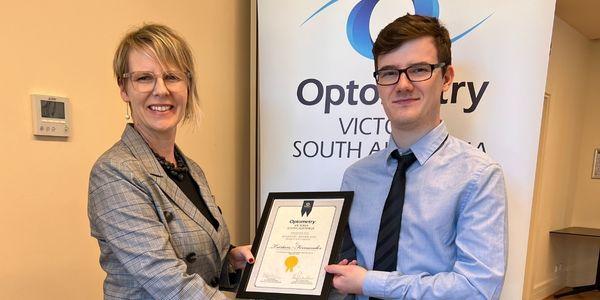2:0min

On Monday, 13 February, Tristan Fernandez was presented with the Optometry Victoria South Australia (OV/SA) Deakin University Student Academic Award, a prize given to the student who demonstrates a strong academic record and an exemplary commitment to the profession.
‘It feels incredible to win the award. It was quite a shock considering the quality of students there; there was so much talent. Thank you to OV/SA, and thank you to Deakin. There was no shortage of candidates and I feel honoured,’ he said.
Tristan now works as an optometrist in Horsham, not far from where he grew up in Warracknabeal, a small town of just a few thousand people to the north. When he first went to university, he was shocked at the amount of people all around him, but he has since learned there are distinct benefits to both city and country practise.
Alex Wisdom from OV/SA sat down with Tristan and asked him about his hopes, passions, and his clear decision to work as a regional optometrist.
What drew you to working as an optometrist in Horsham?
Tristan: I decided on Horsham after I completed my six-month placement there with Michael Peter. He is an excellent optometrist, and I thought if I could get some experience with him, if I could be half the optometrist he was, I’d be doing well. It was a clear decision to head back and work with him and his great team.
Is working as an optometrist what you expected?
Tristan: Optometry is what I expected, sort of. It is and it isn’t. The way the university sets you up is pretty close to what the job is, but there are aspects that it’s just not possible to teach from a textbook. Conditions look like other conditions, patients don’t react in the way you expect, that kind of thing.
I learned a lot through university – we interacted with the Australian College of Optometry, and we saw patients every day with supervision. I had access to great mentors, and a supervised setup is a fantastic way to learn and develop as an optometrist.
But getting into a practice, especially in a town like Horsham, teaches you a whole other set of things, like interacting with patients and taking responsibility. For instance, in Horsham the closest ophthalmologist is in Ballarat, and he has a local clinic, so you have to be on the ball with your calls to get people to commit to that drive. Both patients and ophthalmologists put a lot of trust in regional optometrists.
What kind of benefits do you get in a regional practice?
Tristan: The main benefit of working in country is more responsibility and autonomy, even as a graduate. Having to take that extra level of responsibility right away really helps to expedite your clinical learning. Even as a new optometrist, you really have to be the “one stop shop”.
That’s not to say I wouldn’t be open to working in the city. I think there are a lot of pros of working in the city, you just play a slightly different role. I think it’s important for university programs to go to both rural and city practices and encourage students to get a taste of working in each.
What part of optometry would you describe as your passion?
Tristan: I really am passionate about caring for patients, and I’ll spend time on it even if I’m running behind. It’s so rewarding for the patient, and it actually speeds things up down the line if they understand their condition.
I really enjoy the clinical communication aspect, so if a patient comes through the door without anyone ever having explained their condition to them, it’s worth it to take those five or ten minutes to explain what glaucoma is, explain what macular degeneration is, what cataracts are, explain why we’re waiting, why we need public referral guidelines; it really provides so much benefit to their quality of life.
It’s important to think of the patient in the chair as a person, not a condition. By taking the time to chat with them as a patient and not just a set of eyes, people will recognise and appreciate that, which means you’ll be the optometrist they come back to.
This communication is especially important in regional areas because patients rely much more on optometrists, rather than GPs or their separate glasses vendor. It’s important to manage acute conditions over time, and to do that you have to be a bit more hands-on with communicating.
What do you hope to learn in the future?
Tristan: I’d just like to continue develop clinical skills, and down the line I’d love to pay it forward to other students, whether that’s through mentorship, education, or something else. I’d love to give to other optometrists what I was given when I was coming up.
I hope the next set of students coming through enjoy their time, optometry really is a fantastic career.
This story was created and shared by OV/SA.
Tagged as: regional, student award, university